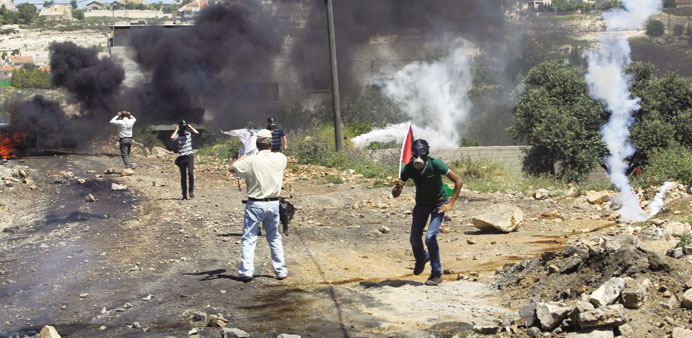Palestinian protesters seek cover from teargas fired by Israeli soldiers during clashes following weekly protests against the Jewish settlement of Qadomem, near the West Bank City of Nablus, yesterday. According to medical sources, 12 Palestinians were injured during the clashes.
AFP/Jerusalem
Israeli and Palestinian negotiators met separately yesterday with US peace envoy Martin Indyk, a Palestinian source said, a day after five hours of three-way talks failed to bring agreement.
Indyk first met chief Palestinian negotiator Saeb Erakat in the West Bank city of Jericho, but no details of their talks were given.
Israeli officials did not respond to requests for information, but media reports said a new tripartite meeting could be held in the coming days.
The previous day’s talks, held in a Jerusalem hotel, were “very difficult”, the Palestinian source said, adding: “The gap... is still wide.”
State Department spokeswoman Jennifer Psaki said this week that Israeli and Palestinian negotiators are striving to reach an agreement to extend their peace talks beyond an April 29 deadline.
But commentator Nahum Barnea, writing in Yediot Aharonot daily yesterday, likened the almost nine months of talks which Secretary of State John Kerry coaxed them into to prolonged “mutual torture”.
“Kerry keeps them going like a gambler in a casino who insists in putting his money on the roulette wheel, with the hope that the wheel will stop on his number at some point,” Barnea wrote.
“He believed that he would reach a peace agreement; then he limited himself to a framework agreement; he later limited himself even further to an American proposal for a framework; and then just to ideas.
“In the end, the entire prestige of the United States is invested in a marginal, questionable deal, which will only prolong the mutual torture.”
Washington is pushing for an extension, but the negotiations hit an impasse two weeks ago when Israel refused to release a group of Palestinian prisoners as agreed at last year’s launch of the talks.
Under the agreement, Israel had committed to freeing 104 prisoners held since before the 1993 Oslo autonomy accords in four batches, but it cancelled the release of the last group of 26.
Among them are 14 Arab Israelis whom the Jewish state is refusing to set free.
The Palestinians retaliated by seeking accession to several international treaties.
Palestinian President Mahmoud Abbas told Israeli opposition MPs visiting him in the West Bank city of Ramallah on Wednesday that if talks were extended, he would want the first three months “devoted to a serious discussion of borders”, Haaretz newspaper reported.
The Palestinians want a state based on the lines that existed before Israel occupied the West Bank and Gaza in the 1967 Six-Day War.
EU urges Israel to reverse West Bank moves
EU foreign affairs chief Catherine Ashton called on Israel yesterday to reverse recent actions, such as announcing new settlements in the occupied West Bank, to bolster faltering peace talks.
Ashton viewed with “great concern” an Israeli decision to declare an area near the Gush Etzion settlement south of Bethlehem as state land and approval of a new Jewish settlement in the southern city of Hebron, a statement from her office said.
The continued demolition of Palestinian property and the confiscation of EU humanitarian aid were also worrying, Ashton added.
Earlier this month, an EU official said Israel had demolished several EU-funded humanitarian housing shelters in a highly sensitive strip of West Bank land near Jerusalem.
“The EU calls on the Israeli authorities to reverse these decisions,” Ashton said.
Such events are “not conducive to the climate of trust and co-operation needed for the current peace negotiations to succeed”, she added.

